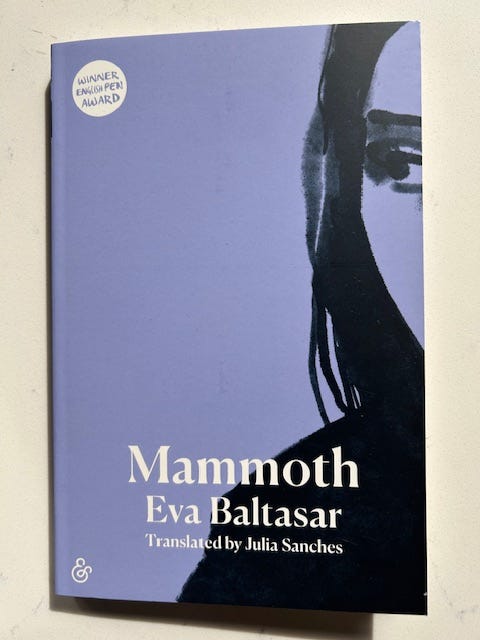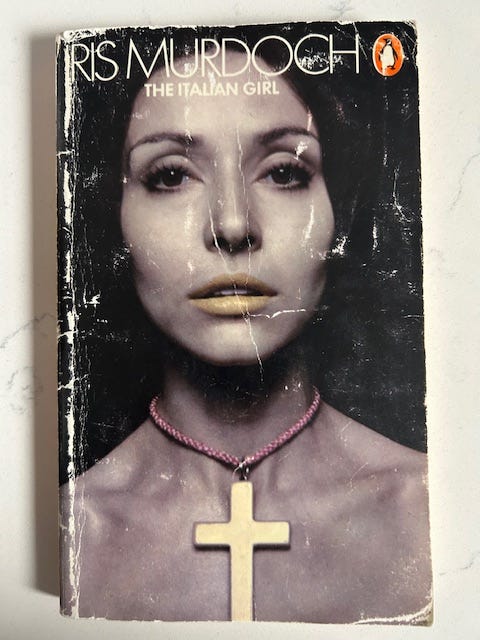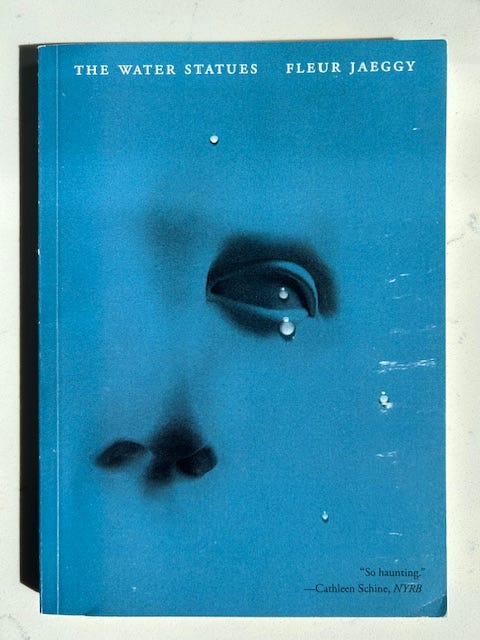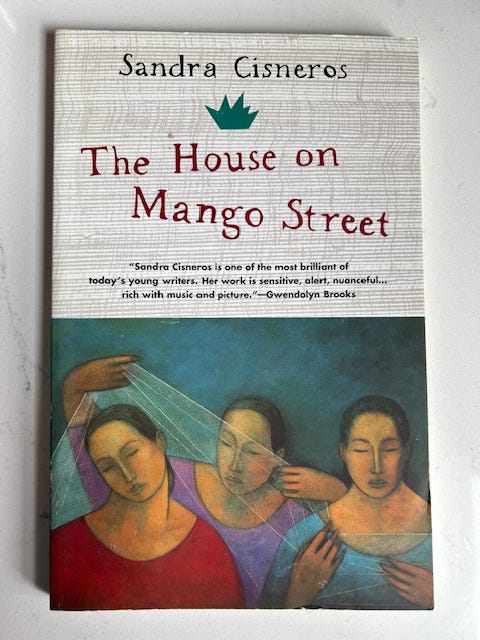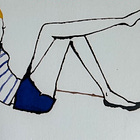3 Novels I Read For Short-Book Summer'Mammoth' by Eva Baltasar, 'The Italian Girl' by Iris Murdoch and 'The Water Statues' by Fleur Jaeggy—Review #239
Donna and I hope you’re enjoying the long Labor Day weekend, which, for us, means short-book summer is winding down. We’ve had a great season of quick reads and, judging by the responses to last week’s thread, many of you have as well. That’s terrific! But now I’m looking forward to cooler weather and to curling up with longer books that have languished on my TBR pile. I’m also going to keep our summer-long weekly publishing experiment going, at least through the end of the year. It seems you’re enjoying the additional newsletters, and I’ve been excited to engage with you more and to have your help in selecting books to review. Would you be interested in helping us even more? We’ve crafted a brief survey to get your feedback about Books on GIF. Are you finding interesting books through the newsletter? Do you have ideas to make it better? We want to hear from you! If you have a few minutes, we’d greatly appreciate your input: We started the summer featuring Three Books You Can Finish in a Day or Two, and we conclude with three more. One is a just-released novella from an exciting contemporary author, one is a novel from my all-time favorite author, and one is … well, I’m not really sure. Let’s dive in. ‘Mammoth’ by Eva Baltasar
I had been looking forward to Eva Baltasar’s ‘Mammoth,’ her latest novel to be translated into English, seemingly since I finished ‘Boulder.’ So when I saw it on display earlier this month, I was like:
A twenty-something lesbian is fixated on getting pregnant. She throws a birthday party to try to seduce a random man who will make that happen. She has this relentless urge to conceive and bring forth a life, but it’s not exactly clear why. Perhaps it’s because the unnamed woman works in close proximity to death. Her job is to interview elderly people at a nursing home for a research project. Sometimes, an interview can carry over to the next day. Some of those times, the participant dies in the night. The woman eventually quits and relocates to a remote area where she gets a job at a bar and rents a house that’s off the grid. Her closest neighbor is an old man who:
The book’s back-cover description sums up her journey without spoiling anything by saying she ‘nurses lambs, battles stray cats, waits tables, cleans house, and dabbles in sex work—all in pursuit of life in the raw.’ As you’ll read below, Baltasar starts her book at full throttle, and she never lets up. But not a word is wasted. Baltasar’s writing is vivid while sparse, precise and deadly. ‘Mammoth’ is a fascinating and fierce novel that explores the drive to live on one’s own terms—and the consequences. I’ll be thinking about ‘Mammoth’ for a while; it took me a few days after finishing it to start a new book. If you’re looking for a short and intense read, I strongly recommend it. How it begins:
My rating:‘Mammoth’ (‘Mamut’) by Eva Baltasar was originally published by Club Editor in 2022. Translated from the Catalan by Julia Sanches and published by And Other Stories in 2024. 103 pages. $16.69 at Bookshop.org. ‘The Italian Girl’ by Iris Murdoch
Thank you for selecting Iris Murdoch’s ‘The Italian Girl’ in our poll earlier this month. I had hoped you would! As many of you know, I love Murdoch’s work—not only have I reviewed ‘The Black Prince,’ ‘The Bell’ and ‘The Sea, the Sea,’ but I also wear this hat around the neighborhood:
Edmund has returned to his family’s English countryside estate to attend his mother’s funeral. She was a tyrant, and they were estranged for years. He arrives to find his relatives in sordid disarray and crisis. His brother, Otto, a stoneworker, has taken on an apprentice named David, who lives on the property with his sister, Elsa. Otto has developed a drinking problem and has been having an affair with Elsa that he thinks is a secret. Meanwhile, Otto’s wife, Isabel, has been having her own affair with David. Edmund’s teenage niece, Flora, pulls him aside to confide that she is pregnant and needs money for an abortion. Edmund, a stiff moralizer, is scandalized and mortified. Instead of helping Flora, he is paralyzed by his pearl-clutching and overwhelmed by all the family drama. (There’s more that I won’t spoil here.) For support, he leans on the ‘Italian Girl,’ a monicker given to a series of Italian women who, over the decades, have served Edmund’s family as maids and nannies. The most recent is called Maggie, though her name is actually Maria. She often is overlooked and taken for granted by the family, but she’s:
I really enjoyed ‘The Italian Girl.’ You know I love messy stories full of drama, and this one is wild. I was riveted, not only by the plot, but also by Murdoch’s crisp, beautiful and evocative writing. I like how the novel explores the ways unresolved boredom, resentment and grief can congeal into a destructive form of denial. It was fun to watch the characters contend with infidelity, deception and loneliness, as well as a big fire, on their journey toward potential catharsis. ‘The Italian Girl’ is a dark romp, and I recommend it. If you’re looking for a quick and juicy read, consider this book. How it begins:
My rating:
‘The Italian Girl’ by Iris Murdoch was originally published by Chatto & Windus in 1964. It was published by Penguin Books in 1968, 1971, 1972 and 1974. 171 pages. $2.30 via Alibris. ‘The Water Statues’ by Fleur Jaeggy
I wanted to return to Fleur Jaeggy’s work after reading ‘Sweet Days of Discipline’ last summer. When I found ‘The Water Statues’ on a trip to Washington, D.C., and saw it was small enough not only to fit into my luggage, but also practically into my shirt pocket, I had to get it. But when I started reading it, I was like: Ever since Beeklam was orphaned in childhood, he has collected statues, which are partially submerged in the flooded basement of his opulent home. The story loosely follows Beeklam, now a wealthy older man who lives like a hermit, as he looks back on his life. Relatives and servants haunt the narrative that unfolds in fragments and vignettes like snippets of memories or dreams. And just like dreams, they are difficult to comprehend and retain. I remember characters talking past each other, sometimes as if they were in a play. I remember snails drinking beer someone had spilled in a garden. I remember a talking crow, but not what it said. I remember beautiful descriptions of water dappling gloomy light onto stone figures. But I was like:
I read ‘The Water Statues’ twice this summer, but not by design. The first time, I couldn’t make heads or tails of it, but I jotted some notes to help with this review. Later, as I was gearing up to write, the draft where I stashed the notes got glitchy. I deleted it in a fit of pique. The notes were gone forever. Even Substack’s AI assistant couldn’t retrieve them despite saying it would try. So I had to read the book again because I had forgotten what I had written down. Was the second reading more clear? Nope. So, I don’t know what to tell you. If you enjoy plotless fiction, this book might work for you. If it does, I’d love if you could explain it to me. How it begins:
My rating:
‘The Water Statues’ (‘Statue d’acqua’) by Fleur Jaeggy was originally published in 1980 by Adelphi Edizioni. Translated from the Italian by Gini Alhadeff and published by New Directions in 2021. 89 pages. $12.97 at Bookshop.org. What’s next:Before you go:
Thanks for reading, and thanks especially to Donna for editing this newsletter! Until next time,
Mike
|



